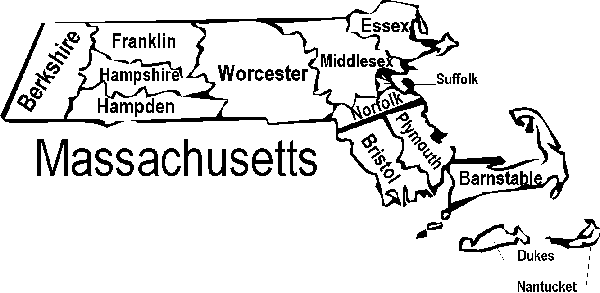
| Division of "Old" Plymouth County in 1685 |
|
From the time the Mayflower and its 99 passengers landed at Plymouth on Nov. 21, 1620, all of south-eastern Massachusetts and western Rhode Island was know as Plymouth County for 65 years. "Government administration had grown considerably since the days when Governor Bradford had Isaac Allerton as his only Assistant. In 1685 the administrative officers for the colony as a whole consisted of one governor, one deputy governor, six Assistants, twenty-eight deputies from seventeen towns(most towns had two), twenty-three constables from seventeen towns, twenty-seven grand jury members from eighteen jurisdictions (the eighteenth being Manamoit, later called Chatham), thirty-eight highway surveyors in seventeen towns, fifty-seven selectmen in seventeen towns, six associate magistrates, three each for Plymouth county and Bristol county (Barnstable county is not shown to have any at this time), six additional members of the Council of War, two from each county, and three majors, one for the military forces of each county. On June 2, 1685, Old Plymouth Colony was divided into three counties; Plymouth, Bristol and Barnstable. Barnstable County The county was named after it's county seat, Barnstable (Barnstable Village). The county consists of the 15 coastal towns located on the peninsula known as Cape Cod. Bordered on the north by Cape Cod Bay, to the east by the Atlantic Ocean and to the south by Nantucket Sound, it is the easternmost point of land in the Commonwealth of Massachusetts. Early records of Barnstable County have suffered with the fire at Barnstable Court House in 1827 and the Town of Chatham. The records of Yarmouth were lost during the Revolutionary War.
Barnstable County lines were redrawn in 1707 and have not changed since. Bristol County Bristol County is located in southeastern Massachusetts. The county seat was Bristol at the time of conception. In 1685 at the time of division, Bristol had the towns of Taunton, Rehoboth, Dartmouth, Swansea, Bristol, Tiverton, Little Compton, Freetown and the plantations of Cumberland Gore and Attleboro. It was bounded on the east by the new Plymouth County. In 1746, part of Bristol County, Massachusetts was detached and the boundries redrawn, due to a long standing boarder dispute. The detached portion became Bristol County, Rhode Island and the county seat of Bristol County, Massachusetts was changed to Taunton. Plymouth County The County seat is Plymouth. The early towns were Plymouth, Scituate (incorporated 1636), Duxbury (inc. 1637), Marshfield (1640), Bridgewater (1656), and Middleborough (1669). Plymouth is best known for being the landing site of the Mayflower and the Pilgrims. Founded in 1620, Plymouth is the oldest municipality in New England. It also is the second permanent English settlement in the modern United States, preceded by Jamestown. The town has served as the location of several prominent events, most notably the First Thanksgiving (1621). Plymouth served as the capital of the Plymouth Colony from its founding in 1620 until the colony's dissolution in 1691. The town of Pembroke (Plymouth County) was the first in the Colonies to rebel against the British crown, in 1740 adopted a resolution to adhere to their rights and privileges, " any royal instructions of his Majesty to the contrary notwithstanding." Massachusetts Bay Colony In 1629 the Massachusetts Bay Company was granted a royal charter and began forming a local government at the Massachusetts Bay Colony. Plymouth Colony joined with the Massachusetts Bay Colony (sometimes called the Massachusetts Bay Company, for the institution that founded it) to form the commonwealth. The union of the Plymouth Colony with the Massachusetts Bay Colony, in 1692, terminated its independent existence which had continued for 71 years. First Inhabitants of Plymouth Colony The early inhabitants of the Massachusetts region included the Nauset Algonquian Indian tribe who lived on Cape Cod; the Massachusett, a North American Indian tribe; the Wampanoag, a powerful Algonquian Indian tribe; the Pennacook; the Mohican (Stockbridge); the Pocumtuck; and the Nipmuck. Early European settlers introduced new diseases to which the American Indians had no natural immunity, with devastating effects on native populations. |

| Surname Lists: |
| ? - D E - G H - Howland, G Howland, H - Howland, P Howland, Q - Hz I - M N - R S - Z |
| Home Page F Y I Cemetery Pages |